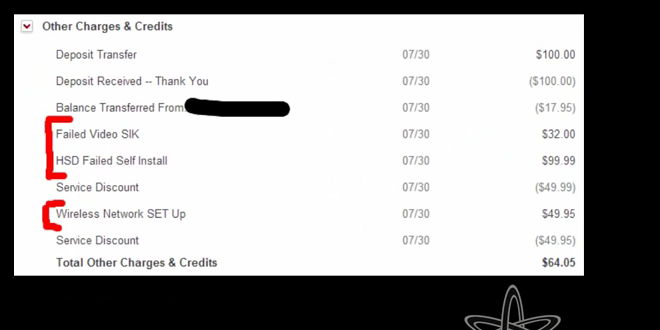Comcast Tells Customer The Only Reason He’s Getting Bogus Charges Refunded Is Because He Recorded Call
Most of us have been in this situation, and probably once or twice with Comcast. You’re told by the first person that something is free, then you get a bill for it and when you call to find out why, everyone you talk to tells you you’re up Turd Creek sans rowing equipment. If only you had recorded that first call, right?
That was the smart move made by YouTuber Tim Davis [via Reddit] when he called up Comcast to complain that Internet service at his new home was spotty.
In the video above (warning: a few instances of NSFW language), Tim explains that he had moved his Comcast service with him when he relocated. At his new place, he did a simple self-install, called up the automated line, and all was well.
Then things went south within a couple of weeks and he was losing his connection for a few minutes at a time every few hours.
A call to Comcast confirmed his issue and determined that it was a problem with the cables running to the building, not anything he’d done when setting up his system.
In the video, Davis includes a brief recording of the Comcast rep telling him there will be no charge because it’s an outside issue.
The tech eventually shows up, is rude, but appears to get the job done. He does some work on the outside lines then quickly pops in to check that everything is working.
All is fine until a week or two later when Davis receives a bill that includes $99.99 for “Failed Self Install,” another $32 for “Failed Video [Self Install Kit], and $49.95 for “Wireless Network SET Up.” That’s $181.94 in total:

But, insists Davis, the problem wasn’t that he failed to do the self-install correctly or that there was a failed self-install kit, since the problem involved cables entering his property that he never touched. Similarly, the tech never set up or did anything with Davis’s WiFi system, so the set-up charge is bogus.
During his first call to Comcast customer service, a rep tells Davis that the tech installed a new coaxial cable jack. Davis not only claims this didn’t happen, but that the tech would have been required to get the landlord’s permission to do that install.
The CSR also asserts that the tech did indeed set up Davis’s wireless system, in spite of Davis’s insistence that nothing had been set up during the tech’s visit.
After being put on hold for an hour, Davis hung up and tried again, this time reaching a supposed “supervisor,” who points out that the $49.95 WiFi setup charge is offset by a $49.95 “service discount,” so that’s free… even though it shouldn’t have been charged to begin with.
She also says there is a $49.99 discount on the supposed “Failed Self Install,” meaning Davis is being charged $50 for the nonexistent failed install, plus the remaining $32 for the failed self-install kit charge. A total of $82 that is still being disputed at this point.
She then offers to give him “BLAST+” Internet service for 12 months free of charge instead of simply taking off the remainder of the questionable charges. This semi-upgrade only has a retail value of $60, meaning he’d still be on the hook for $22 for a call that he’d been told would be free.
Davis, understandably, doesn’t want a cheap Internet service upgrade spread out over 12 months. He wants and asks to have the full $82 refunded.
The rep balks, saying she can’t issue him the credit because it is a “valid charge.”
“Every time we send out a technician there’s a $50 charge for that,” she explains.
“Well, I have a call recorded where the agent tells me in no uncertain terms that there will be no charge,” counters Davis. “You can not bill me for something that I did not authorize. You can not tell me that it’s free, then bill me anyway and then tell me that you can not un-bill me or credit me for the bill.”
“I apologize for that, but there’s no way that I can credit the account,” says the rep, desperately trying to jump back on to her script. “We value you as a customer, that’s why I am trying to check what I can give you.”
She grudgingly agrees to listen to Davis’s brief recording of the initial call. He then points out to her that even if there is indeed a policy of charging customers $50 for every service call, that he is being charged a net $82 that he was never told about and had never agreed to.
The rep promises to look into the issue then call back in up to an hour. She eventually calls back later than planned, and after escalating his call one final time she tells him that the full $82 will actually be credited back to his account.
When Davis asks why she couldn’t simply do that during the earlier call, her explanation is enough to make you pound your head through a wall in frustration.
“We try to negotiate, and again, that is a valid charge,” she answers. “But since I advised my manager that there is a recording and you were misinformed, then she’s the one who can approve that $82.”
Seemingly flabbergasted, Davis asks to confirm, “You’re telling me that if I didn’t have a recording of that call, you wouldn’t have been able to do it?”
“Yes, that is correct,” answers the rep, confirming that the only way to get Comcast to erase a bogus charge from your account is to have recorded evidence that you were promised in advance that the call would be free.
Want more consumer news? Visit our parent organization, Consumer Reports, for the latest on scams, recalls, and other consumer issues.

